The regular intake of omega 3 in diet helps develop the body's defenses against a number of pathologies, for this the food industry is used and enrich some foods, such as milk, eggs or margarine.
Take omega-3s in the right quantities it helps to avoid deficiency pathologies that can lead to neurological deficits , immune and inflammatory systems. Basically, they remain inside the body, keeping cell membranes fluid.
But, nutrition is not always sufficient to guarantee you an adequate supply for your metabolism. In fact, some particular health conditions require a quantity of omega 3 that is difficult to achieve with food. The supplements in these cases they prove to be a valid help for reach the daily requirement.
Omega 3: what they are
There are essential fatty acids, benefits for the development and health of the organism. The term "essential" in nutrition indicates that our body is unable to manufacture them on its own in sufficient quantities to meet its daily needs. They must therefore necessarily be taken with the diet.
There are polyunsaturated fatty acids (PUFA), rich in double bonds between the carbon atoms of the chain (technically called "unsaturations").
This feature allows it to enter the cell membranes of various tissues more fluidly.
They should not be confused with polyunsaturated fatty acids omega 6 (pro-inflammatory molecules). Omega 3s have opposite properties: they are anti-inflammatory.
The regular intake of omega 3 in the diet strengthens the body's immune defenses, improves memory and mood, moreover, protects against the onset of cardiovascular diseases.
In pregnancyinstead, they are essential, together with the B vitamins, for a correct development of the child's nervous system.

Fatty acids
There are various types of omega 3 fatty acids, the main ones being acids:
- alpha-linolenic (ALA)
- Eicosapentaenoico (EPA)
- Docosahexaenoic acid (DHA).
EPA and DHA are found exclusively in animal food sources (salmon, blue fish) and algae. They are the active forms of omega 3, readily available for our metabolism.
The ALA, on the other hand, found in plant foods. It is a precursor (biologically inactive molecule), which must be activated to perform its functions. Our metabolism is able to convert the ALA introduced with food into EPA or DHA (active forms).
This occurs thanks to the Δ-6-desaturasia enzyme, which however has little conversion efficiency: 5% for EPA and 0,5% for DHA.
Due to this very low yield, people following a purely vegan diet they may have omega 3 deficiencies. Even some health conditions, or special cases such as pregnancy, require particular dosages of omega 3 that can hardly be obtained with the diet.
Fortunately, they exist supplements of these fatty acids which can help meet your daily needs.
What are they for?
A healthy and balanced diet it is also rich in omega 3. Everyone should include them in their diet for a proper functioning of their metabolism.
There are antioxidants useful to reinforce the immune defenses, they improve the heart health and arteries by reducing triglyceride levels e cholesterol. Furthermore, they are responsible for maintaining the neural plasticity (i.e. the phenomenon with which our brain builds new neural networks) essential for learning.
Some people may have higher metabolic demands than others, so they shouldn't underestimate the importance of these fatty acids in food.

When and who should integrate
Who should integrate omega 3 in their diet?
- le women before pregnancy and during lactation, to ensure proper formation of the child's nervous system.
- Male child, for growth, memory and learning.
- Senior citizens, for the maintenance of cognitive functions and in the prevention of cardiovascular diseases.
- sports, to reduce post-workout muscle inflammation and promote the catabolysis of intracellular fats.
- Who suffers from some pathologies such as hypertension, hypercholesterolemia or hypertriglyceridemia; in case of intestinal inflammation, or chronic inflammatory diseases, such as rheumatoid arthritis.
However, it is not always possible to satisfy omega 3 needs with food. In order not to risk incurring nutritional deficiencies, they come to their aid food supplements.
These are not drugs, however it is okay consult a nutrition professional to know your needs and not abuse them.
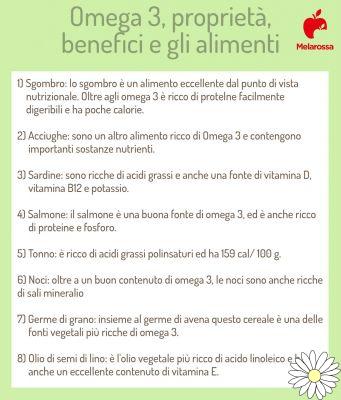
Omega 3: health benefits
These are "good fats". They have antioxidant properties which prove to be of great help to the nervous system and the heart. Their assumption is in fact preventive to the development of some psychic and cardio-circulatory pathologies.
That's why it's good to include them in your diet.
Benefit for the heart
They help reduce the levels of triglycerides and "bad" cholesterol (LDL) in the blood. Triglycerides and cholesterol are dangerous for the health of the heart and circulatory system. In fact, accumulating on the walls of the arteries they are the first cause of plaques and thrombotic events.
Another action of these substances is to increase the "good" HDL cholesterol, which carries the "bad" cholesterol from the tissues to the liver, where it is eliminated.
By reducing the levels of triglycerides and bad cholesterol, they are therefore preventative for the formation of atherosclerotic plaques and thrombi.
The action inflammatory of these polyunsaturated fatty acids, moreover, makes the arteries more elastic, preventing the development of hypertension.
Even theEFSA (European Food Safety Authority) suggests the use of omega-3s in the guidelines of the European Society for the treatment and prevention of hypertriglyceridemia.
Development and health of the nervous system
They are very important for it neural development of the fetus. During pregnancy it is very important not to have deficiencies of these fatty acids, especially DHA. The latter forms a structural part of the neural cells. It is therefore necessary for the formation of the complex neural network of the fetus.
DHA is inserted between the phospholipids that make up the membrane of nerve cells, making them more fluid. In adulthood they are equally important to keep them active synaptic connections (neural plasticity). They therefore play a key role in memory and learning.
In old age, however, they help to maintain psychic and cognitive functions.
In addition, introducing these fatty acids into the diet can improve mood, states of depression and anxiety.
Allies of the immune system
They reduce the effects of pro-inflammatory molecules. Among these mediators ofinflammation there are also the omega 6 fatty acids. This is why it is important to consider the ratio of PUFA omega 6 / omega 3 polyunsaturated fatty acids in the diet.
According l 'INRAN (National Research Institute for Food and Nutrition) this ratio must be less than or equal to 4 for a correct functioning of our organism.
In addition, they promote the synthesis of eicosanoids, which are also anti-inflammatory molecules.
Intestinal well-being
Their anti-inflammatory action is also useful in case of intestinal problems. They are a great help in case of:
- irritable bowel (IBS)
- Colitis
- Generalized inflammation.
Sprint for metabolism
They stimulate the beta oxidation of fatty acids in the mitochondria. In other words, they incentivize the ad cells use up fat reserves to get energy.
However, it is not correct to say that they make you lose weight. However, these are fats - albeit good - with a strong energy power. However, it is recognized a role of "fat burning", because:
- stimulate beta-oxidation.
- They reduce the ex novo synthesis of fatty acids in the liver.
- They lower the level of free triglycerides in the blood.
Therefore, omega 3 supplements in your diet can be a valid one help for fat loss and weight maintenance, if associated with a healthy lifestyle and a balanced diet.
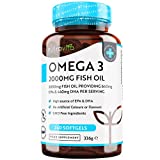 Omega 3 Fish Oil 2000mg - 660mg EPA and ...
Omega 3 Fish Oil 2000mg - 660mg EPA and ... - ✔ WHY NUTRAVITA OMEGA 3 FISH OIL? - Our Omega 3 comes naturally from ...
- ✔ WHY OMEGA 3? - Our Omega 3 fish oil capsules contain essential fatty acids ...
- ✔ WHAT ARE EPA AND DHA? - Docosahexaenoic acid or DHA contributes to the maintenance of normal ...
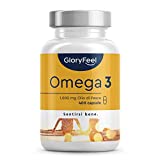 Omega 3 Fish Oil 1000mg High Dose, 400 ...
Omega 3 Fish Oil 1000mg High Dose, 400 ... - OMEGA 3 WITH EPA & DHA - 1000 mg omega3 fish oil, Omega-3 essential fatty acids, with 180 mg ...
- OMEGA FISH OIL 3 CAPSULES - EPA & DHA are essential fatty acids, it means that the body does not ...
- OMEGA 3 SUPPLEMENT - DHA contributes to the maintenance of normal brain function, ...
Contraindications and side effects
The consumption of foods containing omega 3 has no contraindications or side effects. With diet alone it really is difficult to exceed the requirement daily. The same is not true for supplements.
Dietary supplements should be taken under the supervision of a nutrition professional or your healthcare practitioner.
Contraindications they mainly concern their ability to interact with certain drugs. Among them, anticoagulants (warfarin).
That is why it is good to consult your doctor.

Why take omega 3 supplements
Nutritional supplementation cannot be considered a substitute for a balanced diet. However, it can be useful in particular health conditions or at certain stages of life.
When to take omega 3 supplements?
- I followed a vegan or vegetarian diet:
given the low conversion of ALA into EPA or DHA, taking omega 3 exclusively from plant sources, such as soy and linseed, does not allow to cover the daily requirements.
- A future pregnancy was predicted:
as the neural system begins to form in the first weeks of gestation, omega 3 supplementation is necessary a few weeks before the start of pregnancy.
- In case of intestinal malabsorption:
alcune chronic inflammatory intestinal diseases make it difficult to absorb nutrients. This is why a supplement to the normal diet can be useful in these cases. If you are taking any medications, ask your doctor for advice.
On the market there are formulations of supplements with omega 3. You can find them in herbal medicine, pharmacy, supermarket or even online.
Which to choose?
On the market you can also find supplements under the name of "Fish oil". However, there are things to know to choose safe omega 3 supplements.
- IFOS ™ certification (International Fish Oil Standards): is the quality certification of fish oil. Provides information on the quality and safety of the supplement raw material. It takes into account the quantity of omega 3, the presence of environmental contaminants (heavy metals, dioxins, furans, PBC) and the chemical-physical stability.
However, not all supplements are fish oil based. There are also vegan supplements a algae base for which IFOS certification is superfluous.
- Composition of fatty acids: It is better to prefer supplements with good amounts of EPA and DHA, rather than those composed exclusively of ALA. Among the vegan supplements the best are those based on algae, because they are rich in EPA and DHA.
- Other ingredients: Vitamin E (α-tocopherol) is a preservative, it keeps fatty acids in their reduced form (prevents rancidity). In addition, it improves the absorption of omega 3 in the intestine, as well as being a powerful anti-inflammatory and antioxidant itself. Vitamin C, vitamin A, zinc and selenium are also other elements that are good to find in a good supplement.
For dosage and posology, please refer to the package leaflet of the single supplement.
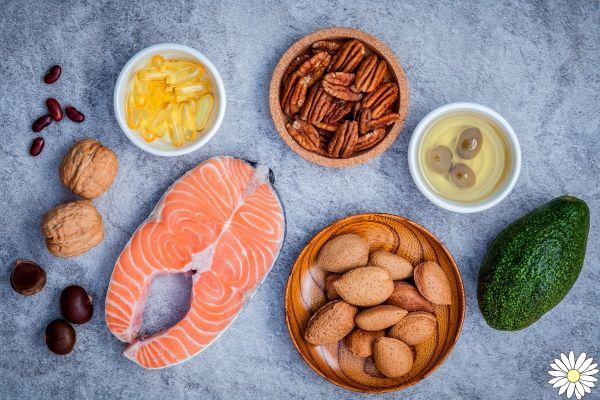
What should you eat to avoid omega 3 deficiencies?
Surely you have heard of the salmon among the foods richest in these fatty acids. But maybe you didn't know that sardines, anchovies, mackerel and many species of blue fish are also very rich in them.
In the principles of a Mediterranean diet, nutritionists in fact suggest consuming one portion of about 200 g of blue fish 2/3 times a week to ensure an adequate supply of omega 3 to your body.
They are also good sources among plant foods:
- dried fruit (walnuts, almonds, pistachios)
- Soy
- Wheat germ
- Flax seed
- Chia seeds
- Some algae.
However, there are differences between omega 3s from plant and animal sources.
As we have seen EPA and DHA are Omega-3 present in fish. ALA, on the other hand, is found mainly in plants. The difference between the two is that our body has to convert ALA into EPA and DHA before we can use it.
For this reason who follow a vegetarian or vegan diet it could run into an omega-3 deficiency due to a conversion that is not always adequate.
The top ten of foods rich in omega 3
1 - Mackerel

Lo mackerel is a fatty fish, source of omega 3. It also provides a good dose of noble proteins. All in a low calorie food.
here are the nutritional values per 100 g of product:
| Calorie (Kcal/100g) | 170 |
| Proteine (g/100g) | 17 |
| Carbohydrates (g / 100g) | 0,5 |
| Lipids (g/100g) | 11 |
| Omega 3 (g/100g) | 1 |
2 - Anchovies

Le anchovies, also called anchovies, are another food rich in Omega 3 and highly recommended from a health point of view for good mineral content such as calcium, potassium and phosphorus.
Here are the nutritional values per 100 g of product:
| Calorie (Kcal/100g) | 96 |
| Proteine (g/100g) | 16,8 |
| Carbohydrates (g / 100g) | 1,5 |
| Lipids (g/100g) | 2,6 |
| Omega 3 (g/100g) | 1,7 |
3 – Sardine

Le sardines, also known as sardines, they are rich in fatty acids and also a good source of vitamin D, vitamin B12 and potassium.
Here are the nutritional values per 100 g of product:
| Calorie (Kcal/100g) | 129 |
| Proteine (g/100g) | 20,8 |
| Carbohydrates (g / 100g) | 1,5 |
| Lipids (g/100g) | 4,5 |
| Omega 3 (g/100g) | 1,5 |
4 - Salmon

Il salmon is a "fatty" fish, but they are all good omega 3 fats (EPA and DHA). It is a good source of protein, and phosphorus.
Here are the nutritional values per 100 g of product:
| Calorie (Kcal/100g) | 185 |
| Proteine (g/100g) | 18,4 |
| Carbohydrates (g / 100g) | 1 |
| Lipids (g/100g) | 12 |
| Omega 3 (g/100g) | 1,9 |
5 - Tuna

Il tuna is rich in omega 3 polyunsaturated fatty acids, although due to its size it is more prone to the accumulation of heavy metals.
Here are the nutritional values per 100 g of product:
| Calorie (Kcal/100g) | 159 |
| Protein (g / 100g) | 21,5 |
| Carbohydrates (g / 100g) | 0,1 |
| Lipids (g / 100g) | 8,1 |
| Omega 3 (g / 100g) | 0,7 |
6 – Nights

Le nights, as well as all dried fruit, are known for multiple nutritional properties, albeit quite caloric. In addition to a good omega 3 content, walnuts are also rich in minerals.
Here are the nutritional values per 100 g of product:
| Calorie (Kcal/100g) | 689 |
| Proteine (g/100g) | 14,3 |
| Carbohydrates (g / 100g) | 5,1 |
| Lipids (g/100g) | 68,1 |
| Omega 3 (g/100g) | 8,9 |
7 - Wheat germ

Wheat germ comes in the form of small whitish flakes, which they can be eaten plain or together with other foods, such as milk and yogurt for breakfast.
The oil that is obtained from wheat germ is one of the richest plant sources of omega 3. However, remember that it is ALA and not EPA and DHA.
Here are the nutritional values per 100 g of product:
| Calorie (Kcal/100g) | 899 |
| Proteine (g/100g) | 0,1 |
| Carbohydrates (g / 100g) | 0 |
| Lipids (g/100g) | 98 |
| Omega 3 (g/100g) | 7 |
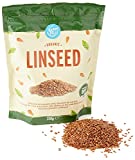 Amazon-Mark: Happy Belly Organic flax seeds 4 x...
Amazon-Mark: Happy Belly Organic flax seeds 4 x... - Organic flax seeds
- Rich in fiber
- Suitable for vegetarian and vegan diets
8 - Linseed oil
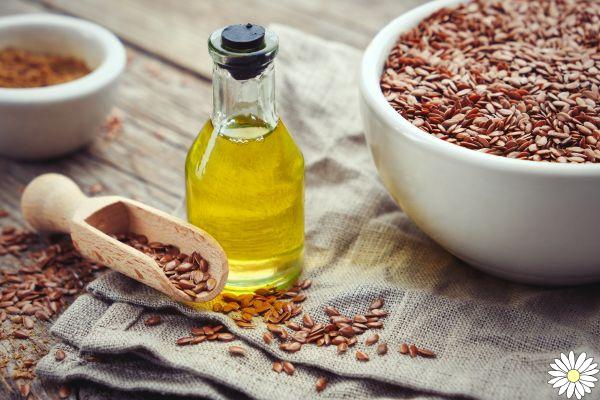
Linseed oil it is obtained from the cold pressing of the seeds of the homonymous plant and is characterized by a slightly bitter taste. It is thevegetable oil richer in linoleic acid and it also has excellent vitamin E content.
Here are the nutritional values per 100 g of product:
| Calorie (Kcal/100g) | 884 |
| Proteine (g/100g) | 0,11 |
| Carbohydrates (g / 100g) | 0 |
| Lipids (g/100g) | 99,98 |
| Omega 3 (g/100g) | 45 |
9 - Blue algae

A good microalgae are a source of plant-based omega-3s. These are single-celled organisms rich in minerals and omega-3 fatty acids DHA and EPA.
Microalgae are the best source of omega 3 supplementation for vegans.
Among these, the blue algae of the genus Schizochytrium spp. or thespirulina algae (Arthrospira platensis), are the best known sources of vegetable omega 3 of marine origin.
The greater quantity of omega 3, however, has thealga Klamath. This is a real super food. It is not a seaweed, but from a lake of the same name in Oregon.
here are the nutritional values per 100 g of product (Alga Klamath):
| Calorie (Kcal/100g) | 278 |
| Proteine (g/100g) | 43 |
| Carbohydrates (g / 100g) | 18 |
| Lipids (g/100g) | 4 |
| Omega 3 (g/100g) | 15 |
10- Krill oil

With the term krill are a group of small crustaceans living in the seabed. Krill is very rich in omega 3 (EPA and DHA) and antioxidants (Astaxanthin). Krill oil is a source of omega 3 polyunsaturated fatty acids. It is not suitable if you have a shellfish allergy.
It is found most often below form of dietary supplement, in capsules often added with glycerol.
Here are the average nutritional values per capsule:
| Calorie (Kcal/capsula) | 5,76 |
| Proteine (g/capsula) | 0,1 |
| Carbohydrates (g / capsule) | 0,05 |
| Lipids (g/capsule) | 0,5 |
| Omega 3 (mg / capsule) | 77 |


























